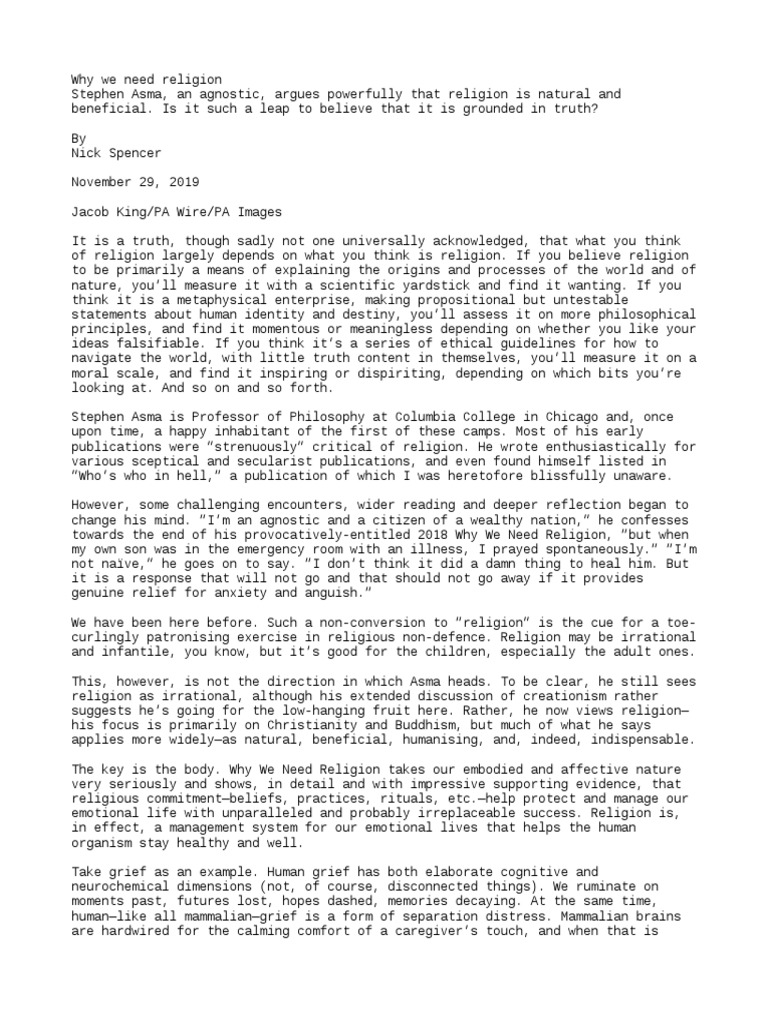In a world characterized by rapid change and diverse beliefs, the question of why one should commit to a religion is particularly pertinent. From the Bahá’í perspective, the practice of religion is not merely a matter of adherence to rites or rituals but a profound engagement with the spiritual and moral dimensions of life. This article explores several compelling reasons for embracing a religious commitment, specifically through the lens of Bahá’í teachings.
1. An Uphill Journey Toward Understanding:
One of the core tenets of religion is the quest for knowledge. Bahá’í teachings encourage individuals to seek truth and understanding. Committing to a religion can catalyze this intellectual pursuit, guiding adherents toward deeper insights and enlightenment. It promotes an ongoing engagement with philosophical, theological, and scientific discourses, urging believers to reconcile faith with reason.
2. A Framework for Moral Guidance:
The need for moral compass is innate to human beings. Religion provides a structured ethical framework that delineates right from wrong. The Bahá’í Faith emphasizes principles such as justice, equality, and service to humanity. These precepts not only foster a sense of accountability but also galvanize individuals to cultivate virtues that contribute to personal and societal betterment.
3. Community and Belonging:
Humans are inherently social creatures. The Bahá’í community exemplifies a global network of individuals united in their spiritual aspirations and commitments to serve. Committing to a religion affords one membership in a spiritual community, promoting camaraderie and support. This sense of belonging is crucial in fostering collaboration and solidarity in times of adversity.
4. Spiritual Evolution and Personal Growth:
Religion is a profound avenue for personal development. Bahá’í teachings advocate for the continuous transformation of the self. This journey often includes periods of introspection, self-examination, and repentance. The act of committing to a religion serves as a catalyst for individuals to confront their shortcomings and strive toward self-improvement, ultimately leading to spiritual elevation.
5. Universal Perspective on Humanity:
A significant aspect of Bahá’í ideology is the concept of the oneness of humanity. Committing to this religious framework broadens one’s worldview, cultivating empathy and compassion for diverse populations. This universal perspective promotes a collective identity that transcends individuality, fostering an ethos of unity and collaboration across cultures and nationalities.
6. Purpose and Meaning:
In existential inquiries, the search for purpose stands at the forefront. Religion provides a narrative that imbues life with significance. Bahá’í doctrine articulates a vision in which individual contributions are part of a larger divine plan. This framework offers adherents the understanding that their actions, no matter how small, have the potential to affect change and contribute to the vast tapestry of existence.
7. Death and the Afterlife:
Many grapple with the nature of death and what lies beyond. Bahá’í teachings provide a coherent understanding of the afterlife, viewing it not as an end but a continuation of the soul’s journey. This perspective alleviates the fear surrounding mortality, encouraging individuals to live consciously and purposefully. Faith in an eventual reunion with the Divine cultivates hope and a sense of peace.
8. A Catalyst for Social Change:
Historically, religions have played pivotal roles in social reform. The Bahá’í teachings advocate for justice and equality, urging followers to engage in social action. This commitment to improving society is a hallmark of genuine religious adherence. Through collective efforts in education, poverty alleviation, and community development, believers can effectuate tangible change, embodying the principles of their faith.
9. Empowerment through Service:
A core Bahá’í belief is that of service to others. Committing to a religion equips individuals with the mindset and motivation to engage in humanitarian endeavors. Such acts are not only expressions of faith but also pathways to empowerment, as they forge connections among people. Serving others instills a sense of purpose and fulfillment that transcends the individual.
10. Spiritual Resilience:
Life is fraught with challenges and uncertainties. A religious commitment provides the tools necessary to navigate these tumultuous waters. Through prayer, meditation, and community support, adherents cultivate spiritual resilience, drawing strength from their beliefs. This resilience is vital in confronting life’s adversities, grounding individuals in their commitment to faith and purpose.
Conclusion:
In deliberating over the question of religious commitment, one must grasp that such a decision encompasses a multitude of dimensions—intellectual, moral, social, and personal. For those considering the Bahá’í Faith, it represents a unique synthesis of spiritual and practical orientations, aiming to foster unity and elevate human consciousness. The journey of faith is not merely a destination but a path towards understanding oneself, others, and the universe. Each of these aspects reinforces the critical role that religion can play in an individual’s life, illustrating the profound need for spiritual engagement in today’s complex world.
